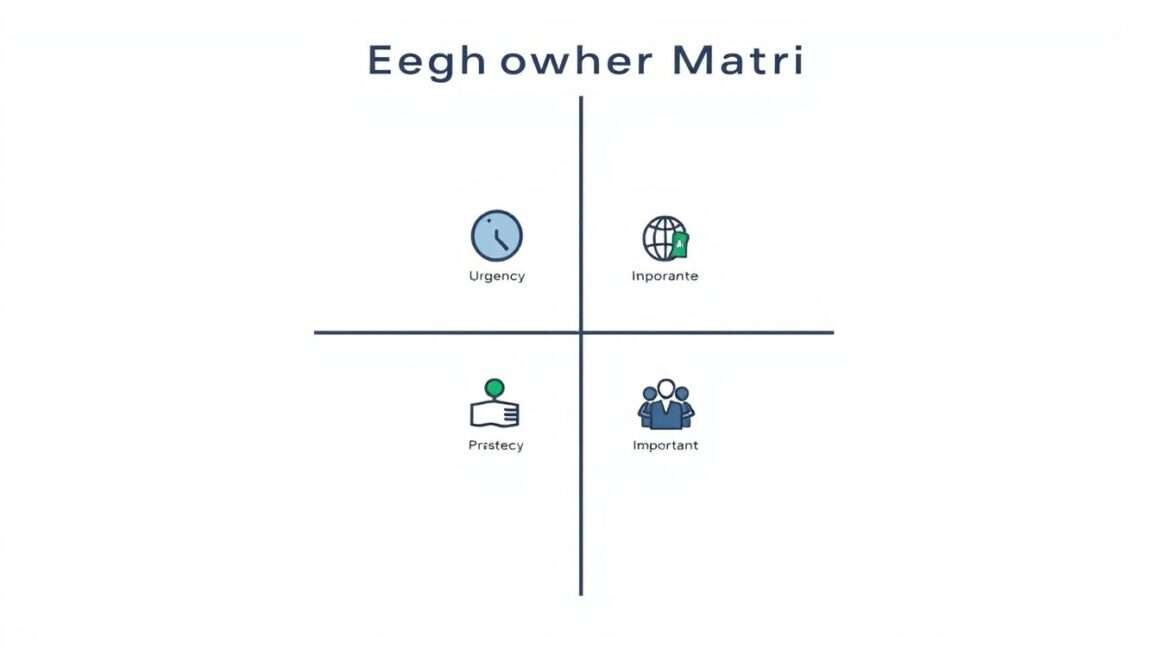In today’s fast world, managing time well is key. It can help you reach your goals or feel stuck. This guide will teach you how to manage your time better.
You’ll learn to prioritize tasks, delegate, and balance work and life. We’ll show you how to stop procrastinating and stay focused. You’ll also find out about tools that save time and change your day.

Key Takeaways
- Understand the importance of time management and its impact on productivity and work-life balance.
- Discover effective prioritization strategies to ensure you focus on high-impact tasks.
- Learn how to overcome procrastination and cultivate a mindset of focus and concentration.
- Explore time management techniques and tools to streamline your workflow and maximize efficiency.
- Learn to balance work and personal life by setting boundaries and scheduling downtime.
Understanding the Essence of Time Management
Good time management is key to success. It means focusing on what’s important and avoiding distractions. This helps you reach your goals.
Why Time Management Matters
Time is very valuable. How you use it affects your life a lot. Learning to manage time well can make you more productive and less stressed.
When you manage your time well, you do what’s most important. This way, you make the most of every moment.
Common Time Management Challenges
- Procrastination – Putting off important tasks is a big problem.
- Distractions – Things like social media can take your focus away.
- Multitasking – Doing many things at once can make you less efficient.
- Poor planning and prioritization – Not planning well can mess up your time management.
Knowing these challenges is the first step to solving them. This helps you reach your full potential.

“Time management is not about being busy, it’s about being effective.” – Zig Ziglar
Prioritization: The Key to Effective Time Utilization
Prioritization is key in time management. It helps you focus on the most important tasks. This way, you can make the most of your day and reach your goals.
The Eisenhower Matrix is a great way to sort tasks. It puts tasks into four groups: urgent and important, important but not urgent, urgent but not important, and not urgent or important. Focus on the first two groups to tackle your priorities.
ABC analysis is another good method. It sorts tasks into A (highest priority), B (medium), and C (lowest). This makes it easy to see what needs your attention first.
- Prioritization techniques, such as the Eisenhower Matrix and ABC analysis, help you identify and focus on the most important tasks.
- By categorizing your tasks based on their urgency and importance, you can ensure that you’re making the most of your time and working towards your most critical goals.
- Effective prioritization is a cornerstone of successful time management strategies, enabling you to achieve more in less time.

“Time management is not about getting more things done, it’s about getting the right things done.” – Peter Drucker
Learning to prioritize is a big step in managing time well. Using tools like the Eisenhower Matrix and ABC analysis can help. They help you stay focused and avoid distractions. By prioritizing, you can lead a more productive and happy life.
Developing a Productive Mindset
Time management is more than just tools and techniques. It’s about having the right productive mindset. This part talks about beating procrastination and improving focus and concentration. These are key to good time management psychology.
Overcoming Procrastination
Procrastination is a big obstacle to being productive. But, it can be beaten. The Pomodoro Technique is one way. It breaks tasks into 25-minute chunks, with short breaks in between. This keeps you focused and stops procrastination.
Task batching is another method. It groups similar tasks together. This makes work more efficient and cuts down on switching between tasks.
Cultivating Focus and Concentration
In today’s world, staying focused and concentrated is hard. A quiet workspace, setting priorities, and mindfulness help. These improve your focus and concentration.
By working on these skills, you can manage your time better. This leads to more productivity.
| Technique | Description |
|---|---|
| Pomodoro Technique | A time management method that involves breaking down work into 25-minute intervals, separated by short breaks, to enhance focus and prevent procrastination. |
| Task Batching | Grouping similar tasks together to increase efficiency and reduce the time spent on transitioning between different types of work. |

“The key is not to prioritize what’s on your schedule, but to schedule your priorities.”
Time Management Techniques and Tools
Managing your time well is key to reaching your goals and being more productive. There are many ways and tools to help you do this. We will look at some top strategies and how they can help your work flow better.
The Pomodoro Technique
The Pomodoro Technique is a well-known method. It breaks your work into 25-minute chunks, called “Pomodoros,” with short breaks in between. This method keeps you focused and stops you from doing too many things at once. It makes you more concentrated, productive, and better at managing your time.
Task Batching and Scheduling
Task batching is another good way to manage your time. It means doing similar tasks together in one go. This saves time and makes you more efficient by cutting down on switching between tasks. Using a good calendar with task batching helps you organize your day and focus on what’s most important.
| Time Management Technique | Description | Key Benefits |
|---|---|---|
| Pomodoro Technique | Breaking down work into 25-minute intervals with short breaks | Improved focus, reduced procrastination, better time allocation |
| Task Batching | Grouping similar tasks together and completing them in one sitting | Increased efficiency, reduced context switching, improved productivity |
| Calendar Management | Utilizing a comprehensive calendar system to plan and schedule tasks | Better organization, improved time allocation, enhanced productivity |
There are also many apps and software tools to help with time management. These tools can make your workflow smoother and give you insights into how you spend your time.

Using time management techniques and tools can really improve your work and life balance. By managing your time well and focusing on what’s important, you can do more and feel more in control and accomplished.
Time Management for Remote Work and Virtual Teams
In our digital world, remote work and virtual teams are common. They need good time management to work well. Managing remote collaboration and asynchronous communication is key for virtual team productivity and telecommuting success.
Remote workers face challenges without being near their team. Without office cues, it’s hard to stay focused. Good time management helps. This includes setting daily plans, focusing on important tasks, and avoiding too many tasks at once.
- Develop a consistent daily routine to maintain focus and discipline
- Prioritize tasks based on importance and urgency to ensure the most critical work is completed
- Minimize distractions by limiting notification overload and creating dedicated work zones
Good communication is key for remote teams. Without face-to-face talks, clear asynchronous communication is vital. Tools like project management software and video calls help teams stay connected and on track.
| Time Management Strategies for Remote Work | Benefits |
|---|---|
| Prioritize tasks and create daily schedules | Increases focus and productivity |
| Minimize distractions and multitasking | Reduces cognitive overload and improves concentration |
| Establish clear communication channels | Enhances collaboration and alignment within virtual teams |
| Take regular breaks and practice self-care | Prevents burnout and supports work-life balance |
By using remote work time management strategies, teams can do well. With the right mindset and tools, remote workers can beat telecommuting challenges. They can reach their full potential in remote collaboration.
Balancing Work and Personal Life
It’s key to have a good work-life balance for success and happiness. We’ll talk about setting boundaries, saying no, and making time for self-care. This way, you can avoid burnout and live better.
Setting Boundaries and Saying No
Setting clear boundaries and saying no is crucial for balance. You can’t do everything for everyone. Know your priorities and share them with others.
- Set work hours and tell your team.
- Say no to things that aren’t your top priority.
- Give tasks to others to save your time.
Scheduling Downtime and Self-Care
It’s also important to have time for self-care and rest. This can be exercise, meditation, or just being with family. Regular self-care helps you handle work better.
- Make time for self-care in your schedule.
- Try different ways to relax and find what works for you.
- Get enough sleep and live healthily.
Work-life balance is a journey. It takes time to find what works for you. By focusing on your needs and setting boundaries, you can live a fulfilling life.
“The ability to maintain a healthy work-life balance is essential for long-term success and well-being.” – Time Management Expert, Jane Doe
Time Management for Students and Academics
Good time management is key for students and academics. They have to balance classes, homework, research, and fun activities. Learning to manage time well helps them work better, feel less stressed, and reach their goals.
Prioritization is a big help. It means knowing what’s most important and focusing on it. This helps use time wisely. It’s about making lists, setting deadlines, and saying no to things that aren’t important.
Another big thing is minimizing distractions. With so many digital distractions, it’s hard to stay focused. The Pomodoro method is helpful. It involves working in short, focused periods with breaks in between. This keeps you on track and stops you from putting things off.
| Study Techniques for Improved Time Management | Benefits |
|---|---|
| Active Recall | Enhances long-term memory and retention |
| Spaced Repetition | Improves the efficiency of study sessions |
| Note-taking Strategies | Facilitates better organization and recall of information |
Using these strategies helps students and academics stay productive. It lets them use their time well and reach their goals.
“Time management is not just about getting more things done, it’s about getting the right things done.”
Time Management for Entrepreneurs and Small Business Owners
Entrepreneurs and small business owners face special time challenges. They must handle many tasks and deal with the ups and downs of their business. Good time management is key to success. We will look at ways to help with entrepreneur time management, increase small business owner productivity, and improve startup time management.
As a business owner, your tasks can change fast. It’s important to have a plan to keep up. Learning to prioritize is crucial. Start by picking your most important tasks and schedule your time for them. Use tools like the Eisenhower Matrix to sort tasks by urgency and importance.
- Prioritize tasks based on their importance and urgency
- Delegate non-essential tasks to free up time for high-impact activities
- Batch similar tasks together to improve efficiency
- Leverage productivity tools and apps to streamline your workflow
- Set clear boundaries and learn to say “no” to avoid overcommitment
Good time management for entrepreneurs also means having a productive mindset. Fight procrastination by breaking big tasks into smaller steps. Focus better by cutting out distractions and working in focused blocks. Remember, as a small business owner, your time is your most valuable asset. Use it well to grow your business and reach your goals.
| Technique | Description | Benefits |
|---|---|---|
| Pomodoro Technique | A time management method that involves working in 25-minute intervals, followed by short breaks. | Improves focus, reduces procrastination, and enhances productivity. |
| Task Batching | The practice of grouping similar tasks together and completing them in one dedicated session. | Increases efficiency, reduces time spent on task-switching, and minimizes distractions. |
“As an entrepreneur, time is your most precious commodity. Mastering time management is the key to unlocking your full potential and driving your business forward.” – Successful Startup Founder
Continuous Improvement and Habit Formation
Mastering time management is a journey. It needs constant improvement and good habits. We’ll talk about tracking your progress, getting feedback, and making small changes to get better at time management skills.
Building time management habits is key for success. By checking your habits often and learning new things, you grow. This helps you stay productive in all parts of your life.
Tracking Your Progress
To see how you’re doing and find ways to get better, try these:
- Write down where you spend your time to find ways to do things better.
- Ask people you trust for their thoughts on how you manage your time.
- Set small goals and check how you’re doing to celebrate and make changes.
Embracing Adaptability
Your time management needs to change as your life does. Be open to new ways, tools, and ideas. This helps you find what works best for you.
| Time Management Technique | Description | Potential Benefits |
|---|---|---|
| Timeboxing | Setting a fixed time for a task or activity. | Helps you focus, avoid putting things off, and guess time better. |
| Digital Detox | Not using digital devices and social media to focus better. | Improves your focus, lowers stress, and helps balance work and life. |
| Priority Matrix | Sorting tasks by how urgent and important they are. | Makes you more productive by tackling important tasks first. |
Being flexible and open is key to building time management habits. This mindset helps you be more productive and happy in work and life.
“The secret of getting ahead is getting started. The secret of getting started is breaking your complex overwhelming tasks into small manageable tasks, and then starting on the first one.” – Mark Twain
Conclusion: Mastering Time Management for a Fulfilling Life
As we finish our journey in time management, let’s think about how it changes our lives. Using the tips from this guide, you can work better and live more fully. You’ll find balance and happiness.
Good time management helps you grow personally and professionally. It lets you focus on what’s important and avoid distractions. This way, you can reach your goals, enjoy life more, and feel happy.
Time management isn’t just about doing things fast or working a lot. It’s about living the way you want and feeling good. By taking care of yourself, setting limits, and growing, you’ll get the most from time management. You’ll live a more rewarding life.
FAQ
What are the key benefits of effective time management?
Good time management boosts your productivity and reduces stress. It helps you reach your goals. You can focus on what’s important, share tasks, and keep work and life balanced.
How can I overcome procrastination and stay focused?
To beat procrastination, try the Pomodoro Technique or task batching. Set clear deadlines. Stay focused by avoiding distractions, creating a good work space, and being mindful.
What are some effective prioritization strategies?
Use the Eisenhower Matrix or ABC analysis to find your top tasks. Prioritize based on urgency, impact, and how it fits with your goals.
How can I manage my time more effectively when working remotely or in a virtual team?
For remote or virtual teams, have clear communication rules and use team tools. Set limits to avoid too much work. Use asynchronous communication and have regular meetings to stay in touch.
What are some tips for maintaining a healthy work-life balance?
Set limits, learn to say no, and plan downtime and self-care. Make your personal life a priority. Don’t let work take over your life.
How can students and academics improve their time management skills?
Students and academics can use the Pomodoro Technique and make detailed plans. Avoid distractions. Focus on studying, research, and assignments, but also make time for rest and fun.
What time management strategies are particularly useful for entrepreneurs and small business owners?
Entrepreneurs and small business owners should focus on what’s most important, delegate tasks, and make their operations smooth. Use automation and tools to improve their workflow.
How can I continuously improve my time management skills?
Always check how you manage your time, ask for feedback, and make small changes. Build lasting habits, stay flexible, and keep learning new ways to manage your time.
